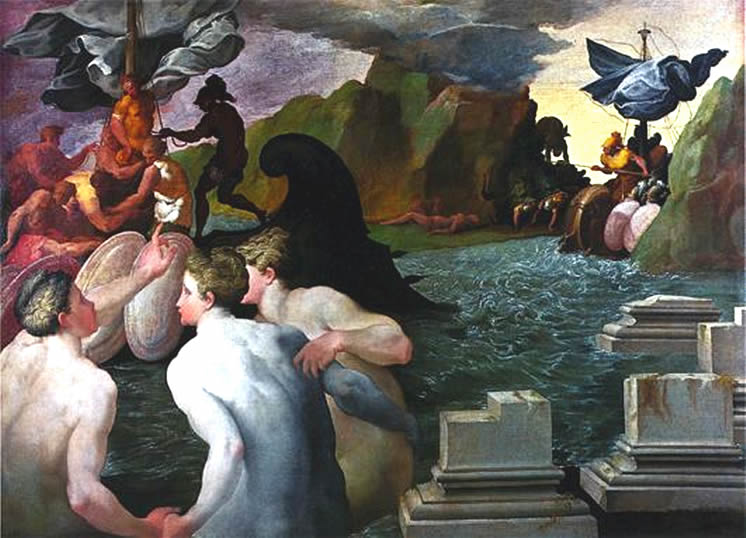Joannes Malalas, Chronographia, 5.20, p. 121
“After he left from Circe’s island, Odysseus arrived at another island, tossed up on it by struggling winds. Calypso, Circe’s sister welcomed him there and considered him worthy of a great deal of help. She had sex with him almost as if in marriage.
He went from there to a massive lake near the sea which was called the Nekyopompos. The people who live around that lake are prophets and they told him everything that had happened to him and what would happen in the future. When he left there, he was thrown from the sea when a great storm arose onto “the Sirens,” rocks which have that name from the peculiar sound that comes from waves crashing around them. Once he freed himself from there, he arrived at the place called “Charybdis,” a wild and desolate territory. He lost all his ships and his army here.
Then Odysseus was carried alone on a ship’s plank in the sea, waiting for a death from violence. But some Phoenician sailors passing by saw him swimming in the water and saved him in their pity. They took him to the island Crete to Idomeneus, a leader of the Greeks. When he saw Odysseus naked and impoverished, he sympathetically gave him a great of gifts because he had been a general with him at Troy along with two ships and people to guard him safely home. He sent him back to Ithaka like this. Wise Dictys wrote these details down after he heard them from Odysseus.”
ἀπὸ δὲ τῆς νήσου τῆς Κίρκης ἐξορμήσας ὁ ᾽Οδυσσεὺς ἀνήχθη εἰς τὴν ἄλλην νῆσον, ὑπὸ ἀνέμων ἐναντίων ἐκριφείς. ὅντινα ἐδέξατο καὶ ἡ Καλυψὼ ἡ ἀδελφὴ τῆς Κίρκης καὶ πολλῆς θεραπείας ἠξίωσεν αὐτόν, συμμιγεῖσα αὐτῶι καὶ πρὸς γάμον.
κἀκεῖθεν ἀνήχθη ἔνθα λίμνη ὑπῆρχε μεγάλη πλησίον τῆς θαλάσσης λεγομένη ἡ Νεκυόπομπος, καὶ οἱ οἰκοῦντες ἐν αὐτῆι ἄνδρες μάντεις· οἵτινες ἐξεῖπον αὐτῶι πάντα τὰ συμβάντα αὐτῶι καὶ τὰ μέλλοντα. καὶ ἀναχθεὶς ἐκεῖθεν χειμῶνος μεγάλου γενομένου θαλάσσης ἐκρίπτεται εἰς τὰς Σειρῆνας, οὕτω καλουμένας πέτρας αἳ ἐκ τῶν κρουσμάτων τῶν κυμάτων ἦχος ἀποτελοῦσιν ἴδιον. κἀκεῖθεν ἐξειλήσας ἦλθεν εἰς τὴν καλουμένην Χάρυβδιν, εἰς τόπους ἀγρίους καὶ ἀποτόμους· κἀκεῖ πάσας τὰς ὑπολειφθείσας αὐτῶι ναῦς καὶ τὸν στρατὸν ἀπώλεσεν, αὐτὸς δὲ ὁ ᾽Οδυσσεὺς μόνος ἐν σανίδι τοῦ πλοίου ἐν τῶι πελάγει ἐφέρετο, ἀναμένων τὸν μετὰ βίας θάνατον. τοῦτον δὲ ἑωρακότες τινὲς ἀποπλέοντες ναῦται Φοίνικες νηχόμενον ἐν τοῖς ὕδασιν ἐλεήσαντες διέσωσαν, καὶ ἤγαγον αὐτὸν ἐν τῆι Κρήτηι νήσωι πρὸς τὸν ᾽Ιδομενέα, ἔξαρχον ῾Ελλήνων. καὶ ἑωρακὼς τὸν ᾽Οδυσσέα ὁ ᾽Ιδομενεὺς γυμνὸν καὶ δεόμενον, συμπαθῶς φερόμενος <καὶ> δῶρα αὐτῶι πλεῖστα δεδωκὼς ὡς συστρατήγωι αὐτοῦ καὶ δύο νῆας καὶ διασώζοντας αὐτόν τινας, ἐξέπεμψεν αὐτὸν εἰς ᾽Ιθάκην. ἅτινα καὶ ὁ σοφὸς Δίκτυς παρὰ τοῦ ᾽Οδυσσέως ἀκηκοὼς συνεγράψατο.

